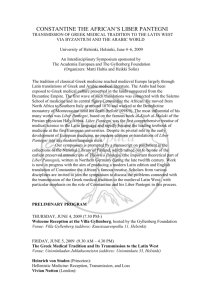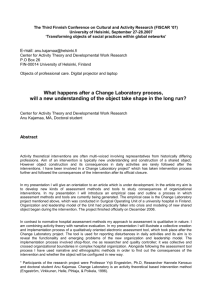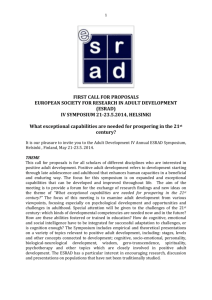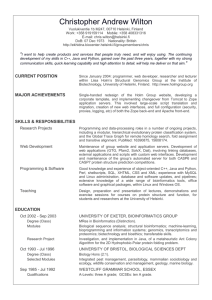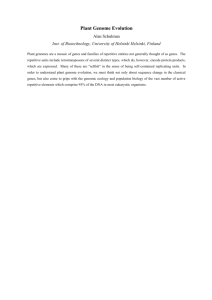constantine the african`s liber pantegni
advertisement
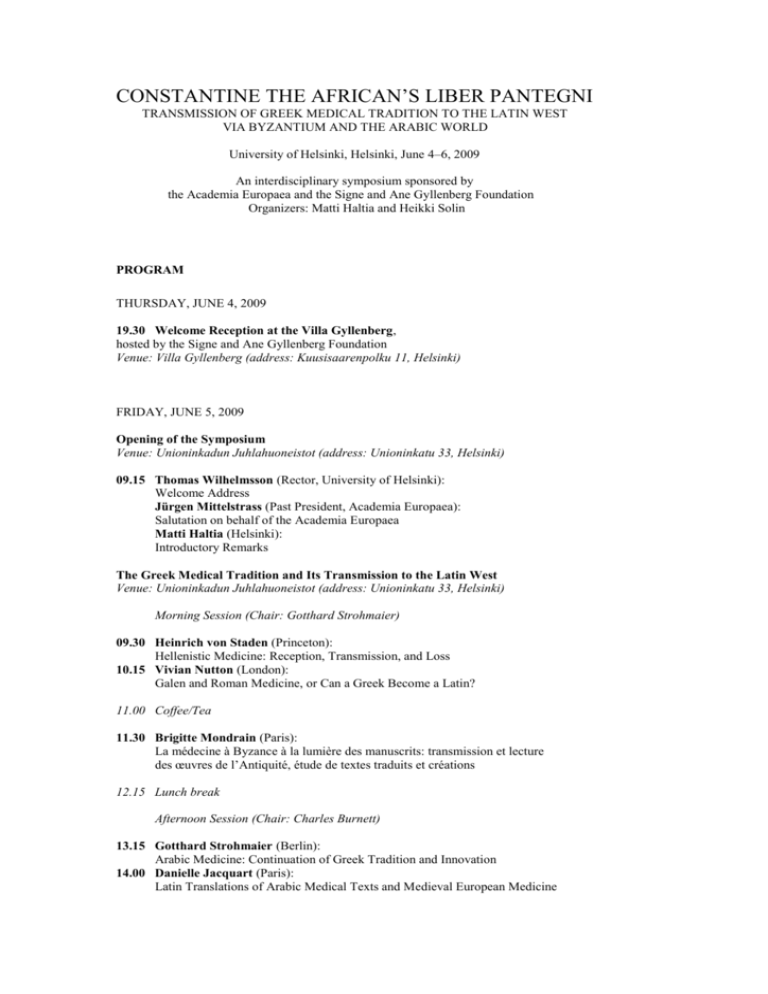
CONSTANTINE THE AFRICAN’S LIBER PANTEGNI TRANSMISSION OF GREEK MEDICAL TRADITION TO THE LATIN WEST VIA BYZANTIUM AND THE ARABIC WORLD University of Helsinki, Helsinki, June 4–6, 2009 An interdisciplinary symposium sponsored by the Academia Europaea and the Signe and Ane Gyllenberg Foundation Organizers: Matti Haltia and Heikki Solin PROGRAM THURSDAY, JUNE 4, 2009 19.30 Welcome Reception at the Villa Gyllenberg, hosted by the Signe and Ane Gyllenberg Foundation Venue: Villa Gyllenberg (address: Kuusisaarenpolku 11, Helsinki) FRIDAY, JUNE 5, 2009 Opening of the Symposium Venue: Unioninkadun Juhlahuoneistot (address: Unioninkatu 33, Helsinki) 09.15 Thomas Wilhelmsson (Rector, University of Helsinki): Welcome Address Jürgen Mittelstrass (Past President, Academia Europaea): Salutation on behalf of the Academia Europaea Matti Haltia (Helsinki): Introductory Remarks The Greek Medical Tradition and Its Transmission to the Latin West Venue: Unioninkadun Juhlahuoneistot (address: Unioninkatu 33, Helsinki) Morning Session (Chair: Gotthard Strohmaier) 09.30 Heinrich von Staden (Princeton): Hellenistic Medicine: Reception, Transmission, and Loss 10.15 Vivian Nutton (London): Galen and Roman Medicine, or Can a Greek Become a Latin? 11.00 Coffee/Tea 11.30 Brigitte Mondrain (Paris): La médecine à Byzance à la lumière des manuscrits: transmission et lecture des œuvres de l’Antiquité, étude de textes traduits et créations 12.15 Lunch break Afternoon Session (Chair: Charles Burnett) 13.15 Gotthard Strohmaier (Berlin): Arabic Medicine: Continuation of Greek Tradition and Innovation 14.00 Danielle Jacquart (Paris): Latin Translations of Arabic Medical Texts and Medieval European Medicine 14.45 Coffee/Tea 15.15 Lola Ferre (Granada): The Jewish Contribution to the Transmission Process 16.00 Matti Haltia (Helsinki): Reflexions of Alexandrian/Galenic Medicine in the Nordic Renaissance: the Neuroanatomical Views of the Finnish Scholar S.A. Forsius (ca. 1560 - 1624) 16.30 Break 18.00 Meeting and Reception with the Friends of the National Library Venue: Cupola Hall, National Library of Finland (address: Unioninkatu 36, Helsinki) Kai Ekholm (Chief Librarian, National Library of Finland) and Leif Andersson (President, Finnish Society of Sciences and Letters): Welcome Addresses Heinrich von Staden (Princeton): Ars longa, vita brevis: Migrations of Greek Medicine from Antiquity to the Early Modern Period Outi Kaltio (Helsinki): Euroopan ensimmäinen lääketieteen oppikirja: Käsikirjoitusaarre Kansalliskirjastossa (Europe´s First Textbook of Medicine; in Finnish) SATURDAY, JUNE 6, 2009 The Salerno School of Medicine and Constantine the African´s Liber Pantegni Venue: Unioninkadun Juhlahuoneistot (address: Unioninkatu 33, Helsinki) Morning Session (Chair: Vivian Nutton) 09.15 Heikki Solin (Helsinki): Was There a Medical School at Salerno in Roman Times? 09.45 Charles Burnett (London): The 12th Century Manuscript of Constantine the African´s Liber Pantegni in the British Library 10.30 Outi Merisalo (Jyväskylä): The 12th Century Manuscript of Constantine´s Theorica Pantegni in the National Library of Finland 11.15 Coffee/Tea 11.45 Raphaela Veit (Tübingen): The Relation of Constantine´s Liber Pantegni to the Arabic original by Haly Abbas 12.30 Outi Kaltio (Helsinki): Chapter V of Constantine´s Theorica Pantegni: a Comparison of Early Manuscripts and the Renaissance Editions 13.15 Lunch (for invited participants) 14.15 Workshop for Invited Participants (Chair: Danielle Jacquart, Heikki Solin) Venue: Unioninkadun Juhlahuoneistot (address: Unioninkatu 33, Helsinki) 1. Outi Kaltio (Helsinki): Edition and translation of Constantine the African´s Theorica Pantegni: Presentation of work in progress 2. Principles in editing a medieval medical text (Round table discussion by the invited participants) 3. Practical problems and open questions related to the editorial work (Round table discussion by the invited participants) 17.00 Break 19.00 Symposium Dinner Venue: Restaurant G.W. Sundmans (address: Eteläranta 11, Helsinki) SUNDAY, JUNE 7, 2009 09.00 Excursion to the Countryside for Invited Participants: Forests, lakes, medieval art, and art nouveau Departure by bus from hotel Scandic Grand Marina (address: Katajanokanlaituri 7, Helsinki) 19.00 Return to Hotel Scandic Grand Marina (approximate time) A Latin Medieval Medical Textbook transmitting Greek, Byzantine and Arabic Tradition Constantine the African’s Liber Pantegni: Transmission of Greek medical tradition to the Latin West via Byzantium and the Arabic world. An interdisciplinary symposium sponsored by the Academia Europaea and the Signe and Ane Gyllenberg Foundation. Helsinki, 4-6 June 2009 The tradition of classical Greek medicine reached medieval Europe largely through Latin translations of Greek and Arabic medical literature. The Arabs had been exposed to Greek medical culture preserved in the lands conquered from the Byzantine Empire. The first wave of such translations was connected with the Salerno School of medicine and its central figure Constantine the African (Constantinus Africanus). He moved from North Africa to Salerno in South Italy at around 1070 and then worked at the Benedictine monastery of Montecassino until his death (before 1098/99). The most influential of his many translations was Liber Pantegni, based on the famous book al-Malakî of the Persian physician Haly Abbas. Liber Pantegni was the first comprehensive treatise of medical science in the Latin language and rapidly became the leading textbook of medicine at the first European universities and medical schools. Despite its pivotal role in the early development of European medicine, no modern editions or translations in Liber Pantegni into a modern language exist. Our symposium was prompted by a manuscript on parchment in the collections of the National Library of Finland, which turned out to be one of the earliest preserved manuscripts of Theorica Pantegni (the important theoretical part of Liber Pantegni), written during the late twelfth century, probably in Germany or Flanders. The manuscript eventually ended up in St. Petersburg, in the collection of old medical books of Joseph von Rehmann, actual state counsellor and personal physician of Tsar Nicholas I. After von Rehmann’s death, the Tsar acquired the collection and in 1832 donated it to the Helsinki University Library (currently the National Library of Finland). Research on the manuscript is now in progress with the final aim of producing a Latin edition and English translation of Theorica Pantegni. Distinguished scholars from various disciplines and different countries and continents were invited to the symposium to discuss subjects related to the transmission of Greek and Arabic medical tradition to the medieval Latin West, with particular emphasis on the role of Constantine the African and his Liber Pantegni in this process. The symposium was accompanied by a workshop concentrating on practical problems and open questions related to the editorial work of Theorica Pantegni. After the fancy welcome reception at the Villa Gyllenberg, hosted by the Signe and Ane Gyllenberg Foundation, the scientific programme of the symposium started next morning with addresses by Thomas Wilhelmsson, Rector of the University of Helsinki, and Jürgen Mittelstrass, Past President of the Academia Europaea. Two sessions with seven presentations were held on the Greek medical tradition and its transmission to the Latin West. The topics concerned were Hellenistic, Roman, Byzantine and Arabic medicine, Latin translations of Arabic medical books, the Jewish contribution to the transmission process, and reflections of Hellenistic medicine in the Nordic Renaissance. The symposium also included a joint meeting and reception with the Friends of the National Library. The event took place at the Cupola Hall of the National Library of Finland where the Helsinki manuscript was on display. Two lectures were given: Professor Heinrich von Staden (Institute for Advanced Study, Princeton), spoke on migrations of Greek medicine from antiquity to the early modern period, and Outi Kaltio, M. A. (University of Helsinki) presented (in Finnish) Constantine the African’s Theorica Pantegni and the manuscript in the collections of the National Library. The next day of the symposium concentrated on the Salerno school of medicine and Constantine the African’s Liber Pantegni with five presentations. In the first lecture the evidence for and against the existence of medical school at Salerno already in Roman times was critically evaluated. Two presentations dealt with codicological aspects of certain manuscripts of Liber Pantegni, one the central object of the symposium, the Helsinki manuscript, and another two in English libraries. The subsequent speaker discussed the relationship of Practica Pantegni (the second part of Liber Pantegni) to the Arabic original by Aly Habbas and to other source txts. Finally, a comparison was made between different textual versions of Theorica Pantegni, and the relationship of the Helsinki manuscript to other preserved manuscripts was examined. The programme ended with a workshop and round table discussion with the speakers. Outi Kaltio presented her work in progress, the editing of the fifth book of Teorica Pantegni. Practical problems, such as choice of manuscripts, correcting of the basic text, orthography, punctuation, etc., were covered in a lively discussion. The future editing of the whole body of Theorica Pantegni was also brought out, and many of the speakers expressed their willingness to participate in the project. The symposium gathered together outstanding scholars to discuss the roots of moden European medicine and Constantine the African’s Liber Pantegni, Europe’s first comprehensive textbook of medicine. Their contributions and continuous support and advice will be of great value for the editing and publishing process of Theorica Pantegni. The two main organizers of the symposium, Matti Haltia and Heikki Solin, members of two different sections of the Academia Europaea (Physiology and Medicine resp. Classics and Oriental Studies) would like to express their sincere thanks to the Academia for taking the symposium under its aegis and for granting a substantial support to its arranging.
